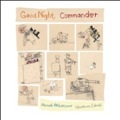 Good Night, Commander
Good Night, Commander
Written by Ahmad Akbarpour
Translated by Shadi Eskandani and Helen Mixte
Illustrated by Morteza Zahedi
Groundwood, 2010
ISBN: 9780888999894
A young boy is playing war in his room, conveying his plan to avenge his mother’s death by fighting the imaginary enemy. He is brave in his commands to his imaginary army and confronts the enemy with bold words—until he meets a soldier with one leg, just as he has. Confronted by a picture of his mother who occasionally speaks to him, the book makes it clear that this young victim of war has not lost compassion for others. He shows his own wooden leg to the enemy soldier on crutches and even lets the enemy try on the leg as he imagines that the soldier has also lost his mother. This child’s perspective is a powerful reminder of the price that children pay as a result of war and the hope for peace from a child’s perspective.
First published in Farsi as Shab be khayr farmandeh in 2005 by UNICEF Iran/Children’s Book Council of Iran, Good Night Commander is illustrated with simple drawings that could well be those of a child. Looking down upon the room in which the boy plays, the reader sees soldiers, guns, tanks, an ambulance, and crutches among the sketches of furniture, light bulbs and a furnace. The flat pencil drawings are shades of tan with occasional accents of red. As the story takes place, the illustrations help create a context that well could have been reality during the war between Iran and Iraq, 1980 – 1988, or during any war. With a brief introduction to this war and the two countries involved, the reader shares one evening in this home where a child is making sense of his life without his mother and his leg, and with a changing family structure due to a new stepmother.
The high regard for Good Night, Commander is obvious in its selection by the International Board on Books for Young People (IBBY) Outstanding Books for Young People with Disabilities list. Its author, Ahmad Akbarpour, has won the National Book Award in his country, Iran, and his book The Emperor of Words (1381 Iranian Calendar) was on the IBBY 2006 Honor List. The illustrator is the recipient of the Noma Concours Encouragement Prize in 2006 and an Honor Diploma award at the Bologna Illustrators’ Exhibition in 2009 as well as numerous other awards for his more than twenty books.
The thought- provoking theme of the price that children pay in times of war can be extended through other picture books, such as Silent Music (James Rumford, 2008), Brothers in Hope: The Story of the Lost Boys of Sudan (Mary Williams, 2005), Four Feet, Two Sandals (Karen Williams, 2007), The Cat with the Yellow Star; Coming of Age in Terezin (Susan Rubin & Ella Weissberger, 2008), and I Never Saw Another Butterfly (Hana Volavkova, 1994). This book can also be discussed with chapter books such as Under the Persimmon Tree (Suzanne Fisher Staples, 2005); Tasting the Sky; A Palestinian Childhood, (Ibtisam Barakat, 2007), and Children of War: Voices of Iraqi Refugees (Deborah Ellis, 2010).
Janelle B. Mathis, University of North Texas, Denton, TX
WOW Review, Volume II, Issue 4 by Worlds of Words is licensed under a Creative Commons Attribution-NonCommercial-ShareAlike 4.0 International License. Based on work at https://wowlit.org/on-line-publications/review/ii-4/

I like this story so much Nasreen’s.